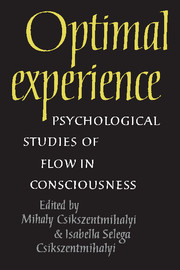Book contents
- Frontmatter
- Contents
- Acknowledgments
- Contributors
- I A THEORETICAL MODEL OF OPTIMAL EXPERIENCE
- 1 Introduction
- 2 The flow experience and its significance for human psychology
- 3 Sociological implications of the flow experience
- 4 Flow and biocultural evolution
- II VARIETIES OF THE FLOW EXPERIENCE
- III FLOW AS A WAY OF LIFE
- IV THE MEASUREMENT OF FLOW IN EVERYDAY LIFE
- References
- Name index
- Subject index
3 - Sociological implications of the flow experience
Published online by Cambridge University Press: 05 June 2012
- Frontmatter
- Contents
- Acknowledgments
- Contributors
- I A THEORETICAL MODEL OF OPTIMAL EXPERIENCE
- 1 Introduction
- 2 The flow experience and its significance for human psychology
- 3 Sociological implications of the flow experience
- 4 Flow and biocultural evolution
- II VARIETIES OF THE FLOW EXPERIENCE
- III FLOW AS A WAY OF LIFE
- IV THE MEASUREMENT OF FLOW IN EVERYDAY LIFE
- References
- Name index
- Subject index
Summary
The social structure of certainty and uncertainty
Flow, for the most part, takes place in avocational rather than vocational activities. Although it would be ideal to enjoy one's work, and in a few fortunate societies this might indeed be the case, it is generally true in our society that most people do not find deep involvement and enjoyment in their productive work, but seek it instead in leisure activities. Csikszentmihalyi (1975b) points out that artists, scientists, surgeons, and members of a few other occupations may experience flow while working, but they constitute exceptions. Most people, most of the time, find their lives made up of predominantly nonflow situations. But what sort of experience is “nonflow”?
Flow occurs in an existential middle ground. We experience it when a balance is achieved between abilities and responsibilities, when the skills we possess are roughly commensurate with the challenges we face, when our talents are neither underused nor overtaxed. Flow emerges in circumstances that are perceived as both problematic and soluble.
Beyond flow are two conditions. Both represent a state of imbalance between challenge and skill. When this imbalance is brief, temporary, or task-specific, we refer to the ensuing responses as boredom or anxiety. The impact of this short-term imbalance is minimal.
- Type
- Chapter
- Information
- Optimal ExperiencePsychological Studies of Flow in Consciousness, pp. 36 - 59Publisher: Cambridge University PressPrint publication year: 1988
- 23
- Cited by

